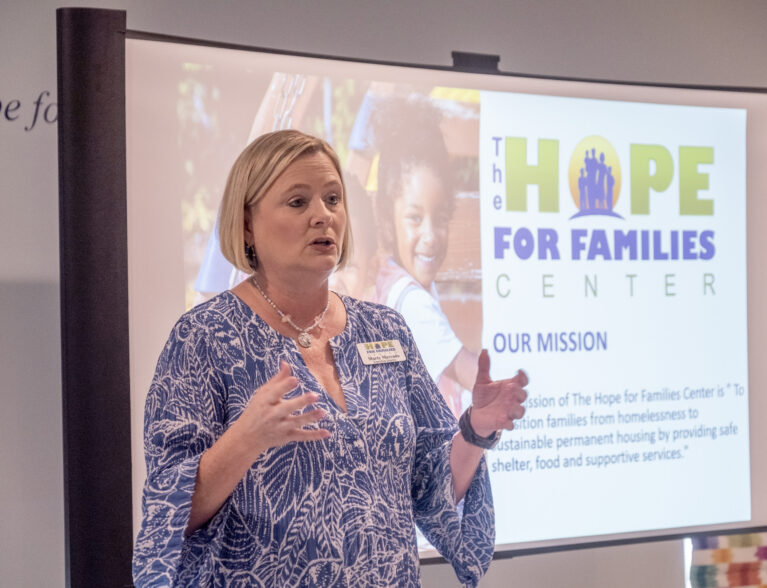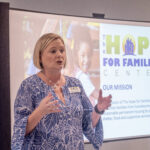
Guests were invited to Eat, Learn and Grow during a Community Leaders Luncheon hosted by the Hope for Families Center, followed by a tour of the facility led by Andrew Welter-Frost, HFC development manager.
“The mission of Hope for Families is to transition families from homelessness to sustainable, permanent housing, safe shelter, food and supportive services,” said Marty Mercado, HFC executive director, in welcome.
“The two big words for me here are sustainable and supportive services.”
She said the small gathering included local community leaders, law enforcement and representatives from nonprofits that provide support services for those experiencing food and housing insecurity, and under- or unemployment – all factors that contribute to homelessness.
Mercado shared that her grandmother had grown up in the foster care system in Pittsburgh and when she aged out at age 18, was homeless for two years. That family history impelled Mercado to accept the position at HFC two years ago.
“We tackle affordable housing and sustainability through poverty level. That requires dedication to get through solid goal setting, strategic planning and overall control of your life,” she explained.
Individually, a lack of affordable housing, unemployment, poverty, mental illness, substance abuse, and the lack of a support system can all spiral a person’s life into turmoil.
“If you have all of it and it’s swirling, it’s a recipe for disaster. Then you add children into that mix, and our kids are very much suffering. We call them our cycle of sufferers,” said Mercado.
HFC provides residents with education, counseling and other services to help them overcome these issues. The education component includes getting a GED, job training, and instruction in financial literacy.
“We realize we can’t do this alone. It’s a community collaboration,” said Mercado.
She noted that, currently, 98 percent of the residents are employed, in large part due to their partnership with United Against Poverty. Mercado explained that residents enroll in UP’s S.T.E.P. (Step Training Employment Program) to gain the skills needed to obtain employment and earn a sustainable wage.
Healthcare is another hurdle that can factor into mounting debt for families. Mercado said 100 percent of their families have primary care physicians, and they refer all residents to either the Mental Health Association or Tykes and Teens where they can receive mental health counseling. As a result, they have seen positive mental health care outcomes increase by 63 percent.
When the families are stable and ready to move out, Mercado said the Treasure Coast Homeless Services Council, Habitat for Humanity, and private donors help them do so, provided they are willing to do the work.
Through donations and subsidy programs, residents receive assistance with first and last month rent, security deposits, furniture, initial electric service costs and reduced rent.
Hope for Families served 63 families this past fiscal year, made up of 82 adults and 115 children, and there are currently between 60 and 100 families on the waitlist. To meet the need, the center needs to double the size of the shelter.
Using land gifted to the nonprofit, they will announce a $5.5 million capital campaign in the fall.
“We have confirmed pledges, and we’re 61.6 percent to our goal,” noted Mercado. “Our goal here is to give sustainable hope.”
HFC plans to host quarterly Community Leaders Luncheons in the future. For more information, visit hopeforfamiliescenter.org.
Photos by Joshua Kodis
- Matt Tanner and Commissioner Laura Moss.
- Marty Mercado and Andrew Welter-Frost.
- Meredith Egan and Jeff Francisco.
- Officer Kelsea Marty and Sharon Stewart.
- Lydia Lander and Chief David Currey.
- Marty Mercado










